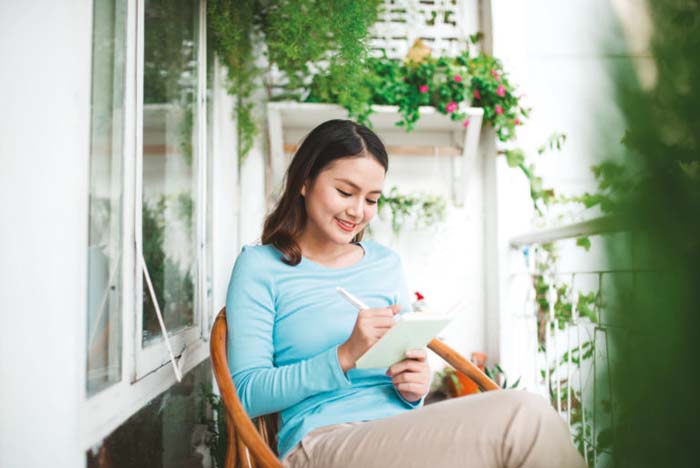Self-care is critical at any time. But during a pandemic, and while juggling work and family-life with blended learning, it is even more important to take care of our mental health for the sake of ourselves and everyone around us. Self-care should extend to every member of your family, as kids are finding these circumstances just as difficult as adults. So, here are some simple yet effective tips to keep the whole family on an even keel.

Mental Self-care
The benefits of doing small but consistent actions have long been touted as essential in any successful self-care routine. Engaging in habits such as meditation, using affirmations, and journaling are excellent ways to reduce stress levels and anxiety. And there are several apps to get you started. Headspace and Calm can help with meditation and The Five Minute Journal is a great way to get started with journalling.
If you prefer the physical act of writing, there is a range of journals available in local shops. “Journaling is what you make it, and, if you can only spare a few minutes, that’s okay; seeing your thoughts on paper can give context and clarity to your goals, which might be just what you need to get them into action,” says Carina Lawson. Carina lives in Doha and is the founder of Ponderlily, an ethically sourced stationery brand centred around intentional, inspired, and sustainable living.
Another area of self-care is self-awareness: know your mental and physical limits. For example, being “touched out” is a term often reserved for new mums experiencing sensory overload from the physical demands of their baby, child, or children. But since the Covid-19 outbreak, this phenomenon has affected parents worldwide, regardless of geography, race, or even the age of their children. Being aware that this is a common feeling and knowing how to manage it is imperative to keeping a harmonious balance at home.
Physical Self-care
Many people underestimate the link between good physical health and good mental health. Getting regular exercise, including a balance of cardio, strength training, and flexibility is ideal. Practices such as yoga or pilates are great ways to link physical and mental exercises. Physical self-care extends far beyond just exercise, however. Make sure your family is enjoying a balanced diet as well as getting enough sleep, and, where possible, spending some time outside for some fresh air and a change of scenery. Remember to also wear masks and practice good hand hygiene to minimise the risk of infection to yourself and those around you.
Minimise the Side Effects of Mask Wearing
Be aware of how to mitigate the physical and mental strains from wearing masks. Some regular mask-wearers have reported temporomandibular joint (TMJ) pain. TMJ pain can be a result of jaw-clenching, a common habit with mask-wearers. A LinkedIn article by Donald R Tanenbaum, a TMJ specialist, suggests the following:
- Some masks fit tightly and pull the jaw upwards, creating tension. Consider wearing slightly looser masks in low-risk situations.
- Ear loops can cause pain and discomfort from your ears, across your jaw joints, and into the face. They can even cause headaches. Consider using “ear savers” to reduce ear pulling.
- Masks can also change head and neck positions leading to jaw pain, so make sure you do regular exercises to keep neck muscles loose and well-stretched.
- Smile! Under your mask you may have your lips pursed with your jaw/teeth clenched, and you may be holding your breath. Smiling can keep lips loose and teeth apart. Plus, concentrating on breathing can relax your jaw.
Wearing masks out and about is currently the new normal, but this can also act as a constant reminder of the pandemic and increase your anxiety levels. Intermittent breath holding (mentioned above) can also worsen anxiety symptoms. To reduce these effects, remove your mask when you get home and take some long, deep breaths to re-centre yourself.
Many schools are now distinguishing between lockdown learning (imposed on everyone involved at short notice with little preparation) and blended learning (a more proactive approach). On the one hand, teachers who had been trained to teach in classrooms found themselves on Zoom calls. On the other, children who were used to seeing their classmates were stuck within the four walls of their own homes. This is now being described by some as “crisis learning”. But blended learning has the advantage of creating some time and distance from those first video calls as there is some level of in-person interaction. Schools have also since learnt lessons about what worked and what did not. There are many lessons that we can apply from our first few weeks of being stuck inside to our current, newer “new normal”.
Set Boundaries
The difficulty with blended learning is that, as with full-time online schooling, there is little to create a divide between school and home. Avoiding burnout is easier said than done when there is set work to do. One way to do this is to create a separate workspace to try to keep home and school separate. While it is not always possible to have a room dedicated to online learning, there are still ways to separate it from home life. You can try setting up a dedicated space for home learning within a room to help get kids in the “zone”, or clearing away the debris of learning by dinner time to make way for family time. Other things that can help are having transitions between school and home life such as a bike ride around your compound before and after “school”, as well as staying tuned for signs of burnout in kids and redirecting them to a completely unrelated task if that happens.
Find a Routine
Only you and your family know what is best for you. Wherever possible, create a routine that works for you all. This could be arranging lunchtime to accommodate a working parent or heading to the pool each day to give everyone a chance to recharge and reset. Keeping normal routines such as making the bed, brushing teeth, scheduling break times, or having a regular call with a grandparent, can go a long way in helping everyone feel more secure in their home environment.
Socialise
As expats, our social network is paramount to our well-being. Without our support systems of family and friends back home, we find ourselves relying heavily on new friends for logistical and emotional help. Covid-19 has taken much of that away with lockdowns and restrictions on gatherings. There are still plenty of ways we can connect such as small gatherings, video calls, or exchanging voice and text messages. Those quiz nights that took off during lockdown need not stop now, especially when there are still many restrictions in place. Never underestimate the value of a good laugh with a friend, a vent with a colleague, or a cry on someone’s shoulder.
This works both ways: remember, if you are struggling with the situation, the chances are someone you know is also having a hard time. Don’t forget to check in with those who are closest to you—you never know whose day you might brighten.

Support Others
When we are feeling down, it can be tempting to put others down or look for their faults to make ourselves feel better. But, a 2017 study quoted in Psychology Today found that making a positive difference in someone else’s life and having other compassionate goals had a positive impact on symptoms in a sample of adults with depression, anxiety, or both. “Doing things for other people has the same effect on your body chemistry as doing something for yourself,” says Polly Bagely, a former Doha resident and founder of Follow Your Sunshine Coaching. Lesson learned: helping others helps us too. And what better reason is there to do it?
Focus on You
With more time spent this year indoors (and in our family’s pockets), there is less time for ourselves. Still, there are plenty of ways to get some alone time, from getting up a few minutes before everyone else to going for a pampering session at your local spa. Even making the effort to put on nice clothes or having a longer-than-normal shower can do wonders for how you feel about yourself. If you’re feeling energetic, how about learning something new or putting yourself out there by making a new friend or making a big leap in your professional life?
Trust Your Instincts
Ultimately, the overriding message of this article is to be kind to yourself. Know your boundaries and triggers as well as those of your family. Cut yourself some slack—there are no prizes for getting the most work done during blended learning, and the costs of ignoring your mental health could be too much to bear. Stay grounded in your own life and stay attentive and intentional. Know when trouble is looming and when something is really wrong or in need of intervention. The solution might be as simple as some help from your child’s school who will be more than happy to help support you.
Get Help
Ultimately, you might have tried all of these suggestions and more. You might have gone as far as you can to make things better, but it is still hard to cope. If that is the case, there are many options available to you in Qatar to get professional mental or physical health help. Remember that you do not have to do all of this alone and that it is okay to get help so you can be the best version of yourself for you and your family.



